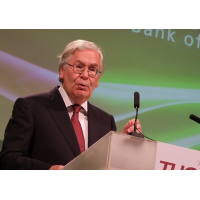
In remarks prepared for a speech in Washington, King – who is stepping down from his role in the summer to be replaced by Mark Carney – said the extraordinary measures central banks have had to take to prop up economies have left their status as independent bodies in doubt.
“Circumstances have demanded that central banks take extraordinary measures. Such measures can risk moving into territory more normally associated with fiscal policy and, in doing so, put at risk their hard-won independence,” he said.
King said as a result of their actions, central banks now face three challenges which could further erode this independence.
“First, there is the risk of appearing to promise too much or allowing too much to be expected of us,” he said.
“With constraints on other policy instruments, central banks are seen as ‘the only game in town’. But failure to make clear the limits to monetary policy risks disillusionment with central banks and the inevitable political pressure on them that would follow.”
He added there was less and less clarity on central banks’ true role in the economy.
“It is still important to ensure that central banks do not take on to their balance sheets risks to the taxpayer that are properly matters that should be decided by elected politicians,” he said.
Finally he warned the expansion of central bank responsibilities to include macroprudential policy and, in the case of the Bank of England, responsibility for regulating the banking system, has made independence much harder to define.
“The deployment of responsibilities outside monetary policy cannot be divorced from the government in the same way as is possible for monetary policy,” he said.
“It is far from straightforward for a central bank governor to be completely independent in terms of monetary policy, somewhat independent in terms of financial stability, and not at all independent in terms of operations that risk taxpayers’ money.”
King said any decisions that put taxpayers’ money at risk must be made by finance ministers. He added central banks must protect their balance sheets by imposing appropriate haircuts on collateral, and avoiding the purchase of risky private-sector assets.
“We must keep sight of three important principles. First, although they should be realistic about what can be achieved, it is right that elected politicians and parliaments decide on the objectives of policy,” he added.
“Second, as we learned in the 1970s, if the central bank is to achieve price stability – its fundamental role – it must be sufficiently independent. And third, in order to protect that independence, its limits should be very clearly circumscribed, and we should be exceptionally careful with decisions that put public funds at risk.”















